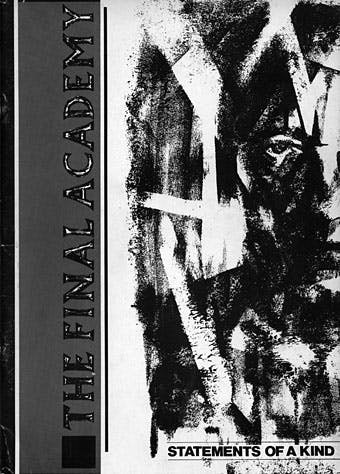
Psychic Tv – Live At The Final Academy
Last Few Days – Live At The Final Academy
Blogpost on The Final Academy From Feuilleton,
A journal by artist and designer John Coulthart

William Burroughs’ reading in the city of Manchester took place on the 4th of October, 1982, at Factory Records’ Haçienda club, as part of the Manchester “edition” of The Final Academy, a Burroughs-themed art event put together by Psychic TV (Genesis P Orridge & Peter Christopherson) and others.
I’ve always been grateful that a record was made of this event, however poor, since I was in the audience that evening, very conscious of the fact that this was my one and only opportunity to see Burroughs in the flesh. His appearance was the magical part of a scaled-down version of the larger two-day Final Academy that had taken place earlier that week in London. The rest of the event was either strange or underwhelming, not helped by the chilly and elitist atmosphere of Manchester’s newest and most famous club. In the days before “Madchester” and the rave scene (the period that gets excised from the city’s cultural history), the Haçienda was a cold, grey concrete barn with terrible acoustics and a members-only policy that required the flourishing of a Peter Saville-designed card at the door. The place was usually half-empty and the clientèle tended to be students living nearby.
Burroughs’ presence that evening at least managed to fill out the space, even if a large portion of the audience didn’t seem to know why they were there or what the whole thing was about. Some of the films made by Burroughs’ collaborator Antony Balch (Towers Open Fire, The Cut-Ups) were shown on the club’s big projection screens then John Giorno took to the stage to give a spirited and funny presentation of his performance poetry. I hadn’t heard of Giorno before, or his Giorno Poetry Systems, which had been putting readings by Burroughs and others on record, but he was very entertaining.
Burroughs followed, reading from The Place of Dead Roads and The Western Lands. It later became apparent that this was part of an ongoing scheme by his manager, James Grauerholz, to get the aged writer in front of audiences and earning some much-needed money. Whatever money he made was well-earned since few writers can deliver their work in public with as much style and wit, as the numerous recordings of his later readings testify. I’m not sure now what I expected from his reading but I remember being surprised at the degree of humour involved. What might seem cold and dead on the page came to life dripping with satiric vitriol under the stress of that snarling delivery. After this, the screening of a lengthy video by Psychic TV was something of an anti-climax, even if the blood and other fluids on display did provoke one audience member to exclaim “Why are you watching this?!” before storming out.
The Final Academy was the first event I attended at the Haçienda and certainly one of the best, equalled only by an incredibly ferocious performance from Einstürzende Neubauten a few months later. This featured broken glass flying into the audience and the band drilling into the concrete wall of the venue with a pneumatic drill (part of their stage equipment at the time) which they then left hanging from the wall. I don’t think the Haçienda management were pleased by that. I caught the Burroughs event just as I was preparing to move to the city myself and it made Manchester immediately seem like a vital and worthwhile place to be; how things change…. It’s curious now the way this pointed towards my future work here; also in the audience that evening were future friends and colleagues Michael Butterworth and Martin Flitcroft of Savoy Books. Mike’s sister was part of the Ikon Video team who were filming the event and Savoy are credited on the Final Academy video release. William Burroughs is one of the dark angels presiding over the entire Savoy project; Mike and Dave Britton recounted in an interview with Sarajane Inkster their memories of meeting him in New York City.

The programme booklets and posters for the Final Academy were designed by Neville Brody. Among the many photographs inside Brody’s booklet are some showing Burroughs in the Rue Git-le-Coeur, Paris, from the period when he was living in the famous Beat Hotel with Brion Gysin and others. I managed to track down the hotel on my last trip to the city. The street seems to have retained much of its earlier character but the hotel itself has received a bland makeover that says “international” and “expensive”. One can’t help but wonder where the Beats would migrate to today in the search for cheap accommodation; it certainly wouldn’t be Paris or London or, for that matter, Manchester. Prague? Somewhere in Brazil maybe?
The Final Academy was a defining moment in what, for want of a better term, is now seen as the Industrial Culture scene, Burroughs having been adopted as godfather by most of the prime movers in that movement-that-wasn’t-quite-a-movement. Psychic TV grew out of Throbbing Gristle, of course, and one of the last releases on TG’s Industrial Records label was Nothing Here Now but the Recordings, a collection of Burroughs’ early tape experiments. 23 Skidoo sampled (in the days before sampling…) a snatch of those recordings for The Gospel Comes to New Guinea, a single produced by Cabaret Voltaire, and both these bands played at the London Final Academy event.
At the time this meeting of literary and avant garde musical culture didn’t seem so surprising but 24 years on it seems increasingly unique and unrepeatable. Despite Burroughs’ considerable influence, the events in London and Manchester weren’t the inspirational moment that the organisers and participants might have wished as the 1980s turned out to be a decade of pop trivia and much political and cultural conservatism. Burroughs continued to produce good work (his musical collaborations, Seven Souls with Material and the Dead City Radio readings were high points) but Brion Gysin died in 1986 and many of the musical performers gradually ran out of steam or lost their way as the decade progressed. The “final” part of The Final Academy was more of a terminal declaration than anyone realised at the time.
Read John Coutlhard’s original article at “Feuilleton” here.
